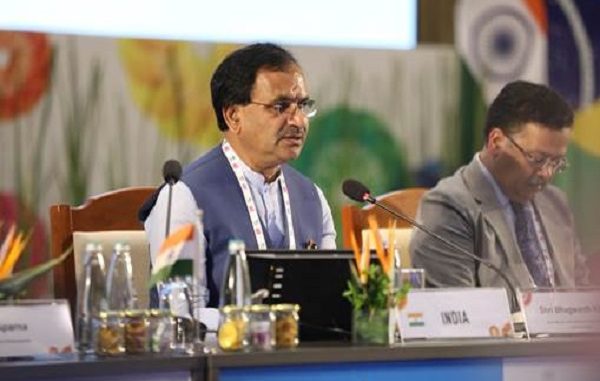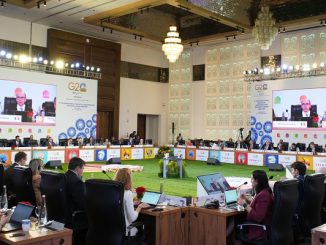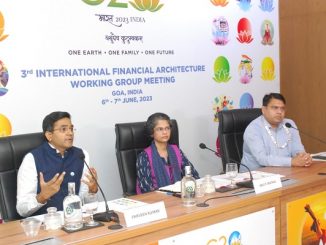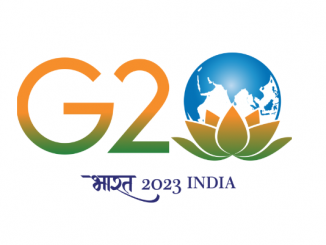
Jun 05: Union Minister of State for Chemicals and Fertilizers, Shri Bhagwant Khuba delivered the inaugural address at a side-event of the 3rd G20 Health Working Group Meeting, titled, “Strengthening Global Collaboration Network on Research and Development in Medical Countermeasures (Diagnostics, Vaccines and Therapeutics) with a focus on Future Health Emergencies”, here today. He was also joined by Dr V K Paul, Member (Health), NITI Aayog.
The purpose of the event was to reinforce the second priority of India’s G20 Presidency, which is to strengthen cooperation in the pharmaceutical sector with a focus on access and availability of quality, effective, safe, and affordable medical countermeasures (MCM). Given the importance of focusing equally on each component of the Vaccine, Therapeutics, and Diagnostics (VTD) value chains, India’s G20 Presidency has been discussing how to coordinate the various aspects of the upstream and downstream facets of the MCM ecosystem.
“India’s digital goods are for the world. India’s digital infrastructure and capabilities are enablers of global economic growth and human development.” This was stated by Dr V K Paul, Member (Health), NITI Aayog while delivering the keynote address at the session on ‘Digital Health Innovations and Solutions to Aid Universal Health Coverage and Improve Healthcare Service Delivery’, on the second day of the 3rd Health Working Group of G20 India, at Hyderabad, Telangana today.
Elaborating further Dr. Paul stated “Digital Health enables universal health coverage through access to health care services by people regardless of their location and socio-economic status through initiatives such as telemedicine and mobile application. It also facilitates universal health coverage through a seamless exchange of health information amongst providers, systems, patients, policy-makers and so on through multiple systems.” Underscoring the impact of digital initiatives, Dr Paul cited the example of Ayushman Bharat Digital Mission stated, “it brings together state government, union government, laboratories, insurance providers, health tech companies, doctors, NGOs program managers, other stakeholders keeping the citizens at the centre of this endeavours.”
Underlining the significance of digital health, Dr Paul urged all to become a part of the global revolution in digital health for universal health coverage. He stressed, “Let us envision a world where a comprehensive package of digital health tools and services are accessible to all, where digital health is for all by 2035.”
The other important speakers for the session included Dr Christopher Elias, President, of Global Development, Bill and Melinda Gates Foundation and Dr Alain Labrique, Director, Department of Digital Health & Innovation, WHO.
Dr Christopher Elias commended the inclusion of Digital Health as a priority in the G20 Presidency and said “Inclusivity, equity and affordability are key principles for this priority. He further said “Technology, in particular digital technology, has a critical enabling role to play in accelerating the progress towards universal health coverage and improving health service delivery. The world has witnessed the significant momentum of digital health and the development of digital health tools that lower- and middle-income countries have experienced over the last decade, and especially due to the onset of the recent Covid pandemic.”
Speaking on the occasion, Dr. Alain Labrique stated “When we talk about digital health, we are talking about strengthening primary health care systems, improving universal health coverage, and timely and relevant data for decision making and resource allocation. Most important, we are talking about equity so that no one gets left behind. Digital health is a proven pathway to achieve universal health goals.”
Underscoring the relevance and importance of digital health, he said that the pandemic has galvanized many governments to move from digital experimentation to digital transformation. The global initiative on digital health levels the playing field optimizing investments, democratizing access to the building blocks and improving the responsiveness that the country needs. Emphasizing that digitalization of global health systems is inevitable. Underlining the ramifications of that he said “Whether it happens in a way that ensures quality, efficiency, equity and inclusion will depend on we as a group move together.” Highlighting the role of the G20 Presidency, he said “We must as a group invest strategically. This will enable cross border exchange of credential health information now available to all member states.”
Members of the Troika from Indonesia and Brazil lauded Digital Health as a powerful tool in the universal axis for health and stated digital health represents a transformative breakthrough enabling comprehensive and accessible health care. They recommended collaboration with member countries and key stakeholders and urged the participation of international organizations in supporting and guiding countries for adapting to the norms of the global digital health network. They emphasized fostering the development of digital infrastructure in relevant areas, promoting digital literacy and education and ensuring accessibility of digital health solutions for all.
Union Health Secretary Shri Rajesh Bhushan highlighted the three health priorities of the G20 India Presidency and lauded the contributions of the participations. Noting that the next pandemic will not wait for us to make a global treaty, he stated that “it is the need of the hour to ensure that the next pandemic sees us adequately prepared as billions of lives and livelihoods will be at stake hence, we must act with a sense of urgency”. He urged all the stakeholders to come together and act for ‘One Earth, One Family, One Future’, the theme of India’s G20 Presidency.
Dr Rajiv Bahl, Secretary, Dept of Health Research and DG, ICMR; G Kamala Vardhana Rao, CEO Food Safety & Standards Authority of India (FSSAI), Shri Abhay Thakur, Additional Secretary, Ministry of External Affairs and Sous Sherpa of India’s G20 Presidency, Shri Lav Agarwal, Additional Secretary, Ministry of Health and Family Welfare, Smt. Hekali Zhimomi, Additional Secretary, Ministry of Health and Family Welfare, government officials, representatives from the G20 member countries, special invitee countries, international organizations, forums and partners like WHO, World Bank, WEF etc., and senior officers of the Union Government were present for the session.
Addressing the gathering, Shri Bhagwant Khuba emphasized the need to strengthen existing health architectures and be better prepared for responding to recurring outbreaks and future pandemics. He said that “countries worldwide have come to realize the importance of research and development collaboration in providing novel solutions to emerging health challenges.”
Shri Bhagwant Khuba stated that collaborative research enables the pooling of expertise and resources from multiple disciplines and institutions, leading to a more comprehensive understanding of diseases and the development of more effective VTDs. He said, “Engaging with global health organizations and stakeholders for research and development collaboration would facilitate coordinated resource allocation, ensuring that resources such as funding, medical supplies, personnel, and information are distributed effectively and efficiently. By aligning priorities, duplication of efforts can be minimized, and resources can be directed to areas and populations most in need”.
The Union Minister emphasized that the Global R&D Network is aligned with the principles of India’s G20 ideology, “Vasudhaiva Kutumbakam” – One Earth, One Family, One Future and is aimed at fostering collaboration in accessing safe, effective, quality, and affordable Medical Countermeasures (VTDs). “This initiative aims to enhance cooperation and partnerships among nations in global research and innovation for VTDs, with the ultimate goal of ensuring universal access to these essential medical resources”, he said.
Shri Bhagwant Khuba noted that “India’s presidency of the G20 has focused on fostering international collaboration to address pressing global issues, as specified by the Hon’ble Prime Minister, recognizing the interconnectedness and shared responsibilities of nations in finding solutions to these challenges”. Emphasizing that India has consistently demonstrated a strong commitment to research and innovation, at global platforms such as the World Health Assembly, World Economic Forum, and G7, among others, he said, “The primary objective of this collaborative effort is to optimize research and innovation endeavours in prioritized areas and diseases”.
Highlighting India’s efforts towards collaborative research, he stated that “India has taken an important step towards collaborative research and development at the national level through the National Biopharma Mission, an Industry-Academia Collaborative Mission aimed at accelerating early development for biopharmaceuticals, offering promising opportunities for collaboration”. “Another notable example of national collaboration also includes Indian SARS-CoV-2 Genomics Consortium (INSACOG), jointly initiated by the Union Ministry of Health and Family Welfare, the Department of Biotechnology (DBT), the Council for Scientific & Industrial Research (CSIR), and the Indian Council of Medical Research (ICMR)”, he stated.
Disclaimer: We donot claim that the images used as part of the news published are always owned by us. From time to time, we use images sourced as part of news or any related images or representations. Kindly take a look at our image usage policy on how we select the image that are used as part of the news.


